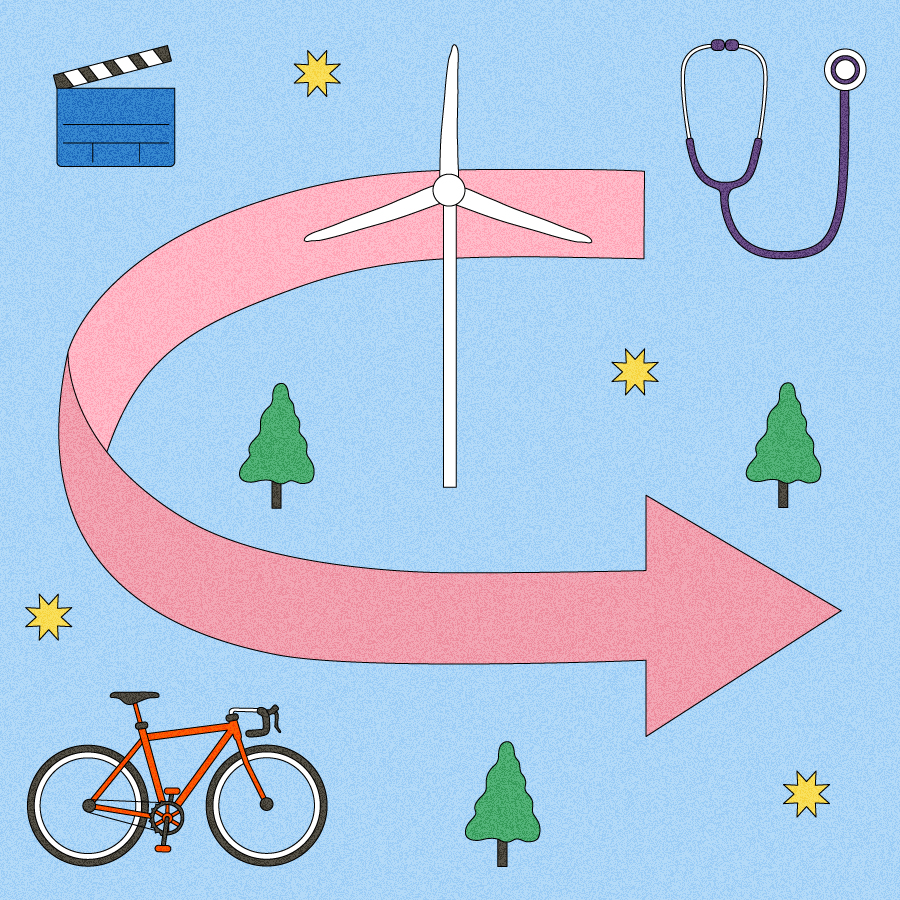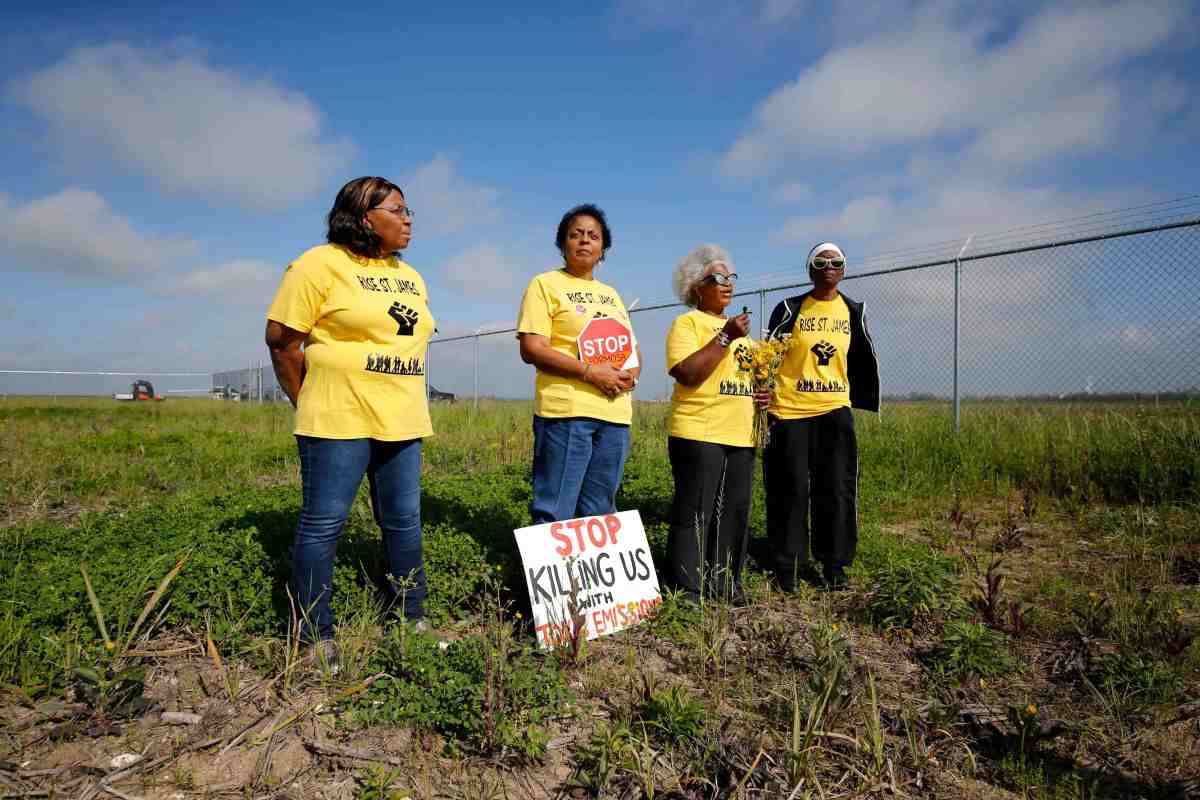Also: A reminder to RSVP for our upcoming book club gathering! This go-round, we’re adding a way to join the discussion before and after the live event. More details below.

The vision
“At the end of the day, I don’t want any of our children to say, ‘Why didn’t you do something about it when you could?’”
Nicole Horseherder, water rights activist
The spotlight
Yesterday, we published the final episode in the third season of Temperature Check, Grist’s flagship podcast covering climate, justice, solutions, and the people fighting for all of the above.
Our third season focused on “pivot points” in people’s climate journeys. Career changes, growth moments, battles fought and won — the six leaders profiled this season each have incredible stories about how they came to climate work and what twists and turns they’ve taken along the way.
“It’s strange and fun to be middle-aged and suddenly feel like you can radically change your life,” Nathanael Johnson shares in one episode of the podcast. Nate wrote for Grist for nearly a decade. But in January of last year, in the midst of an illustrious career in journalism, he decided to leave the field entirely — and instead train to become an electrician. The move was driven in part by a desire to work in a more direct way on the electrify-everything movement, a trend he had covered for years. (And in fact, a shortage of skilled laborers presents a significant barrier to the push for electrification.)
“The idea that I could continue the work that I’d been doing as a journalist in the climate space, but just do it with my hands instead of my words, was a real component of my interest in electricity,” Nate says in the episode. “The idea of simply setting all that talk aside and just getting down to business and actually literally slipping on the gloves and getting my hands dirty electrifying one thing at a time was exciting.”
In Temperature Check’s finale episode, activist Nicole Horseherder shares how she was called to organize against coal companies in the Navajo Nation. After obtaining a master’s degree in linguistics, she returned home hoping to find a job at a local university, perhaps teaching her Diné language. Instead, she found herself wondering how she would be able to live on the plot of land her grandmother had left her. The groundwater was depleted.
“I found that one of the springs was dry, and one of the springs, the water wasn’t collecting anymore,” she says. “That’s how the questions came … What happened to the water?”
The answer: Coal mining operations were draining the nation’s aquifers. So instead of pursuing a teaching job, Nicole formed the advocacy organization Tó Nizhóní Ání, which translates to “sacred water speaks,” to mobilize her community to fight for their water rights. In 2005, they won their first victory with the successful shutdown of the Mojave Generating Station.
“I was numb,” Nicole says. “It wasn’t until days later that I realized how very important it was. The work was just so intense, for so long, that I felt nothing.”
Still, she kept at it, helping to close down two mines and block new owners from taking over another plant, the Navajo Generating Station, when it closed. Today, in yet another pivot, Nicole and Tó Nizhóní Ání are helping to guide the clean energy transition for the Navajo Nation and ensuring that corporations aren’t making decisions for its citizens.
Each story in this season of Temperature Check showcases how a person found, developed, or changed their mind about the way they could contribute their unique skills to some of the greatest challenges facing communities and our planet as a whole. Check out the entire season here.
And to continue exploring this topic, next week, we’re launching a special series here in Looking Forward. We’re going to examine personal climate action — what that means, how ideas about it have evolved in the climate movement, and how to think about it in an age when many people are concerned and want to do their part, but many are also unsure about what that part is.
We’re excited to go on this journey with y’all over the next month! Stay tuned for more.
— Claire Elise Thompson
More exposure
- Listen: to the first two seasons of Temperature Check, which explore themes of race and culture and mentorship within the climate movement
- Read: the Climate Forward newsletter from NYT did a recent issue sharing readers’ jobs in the climate space — including some interesting career switches
- Browse: a roundup of some other great climate and sustainability podcasts to check out (Variety)
On our horizon
Our next book club gathering is one week away! RSVP here for our discussion of Robin Wall Kimmerer’s Braiding Sweetgrass (June 7 at 6 p.m. ET).
For this edition of the book club, we’re experimenting with a way to further the discussions and connections that happen on our oh-so-brief Zooms together. We created a space on Bookclubs.com — click the link to join! Go to “club messages” (in the menu bar on your left if you’re on desktop, or at the top on mobile) to start chatting with us and your fellow readers about the book ahead of our Zoom gathering.
All Looking Forward readers are welcome to join the Bookclubs.com discussion, whether you’ve read the book, you’re coming to the event, or not. We hope to see you there!
A parting shot
Award-winning activist Sharon Lavigne (shown here, second from the left) also shared her story for the podcast. Much like Nicole, after discovering the impacts of chemical plants on her community, she was moved to stand up and fight for the people and places she loved. Her organization, Rise St. James, helped block a petrochemical complex that would have been built two miles from her house in St. James Parish, Louisiana, with actions like the live video stream shown here. Listen to her story.



